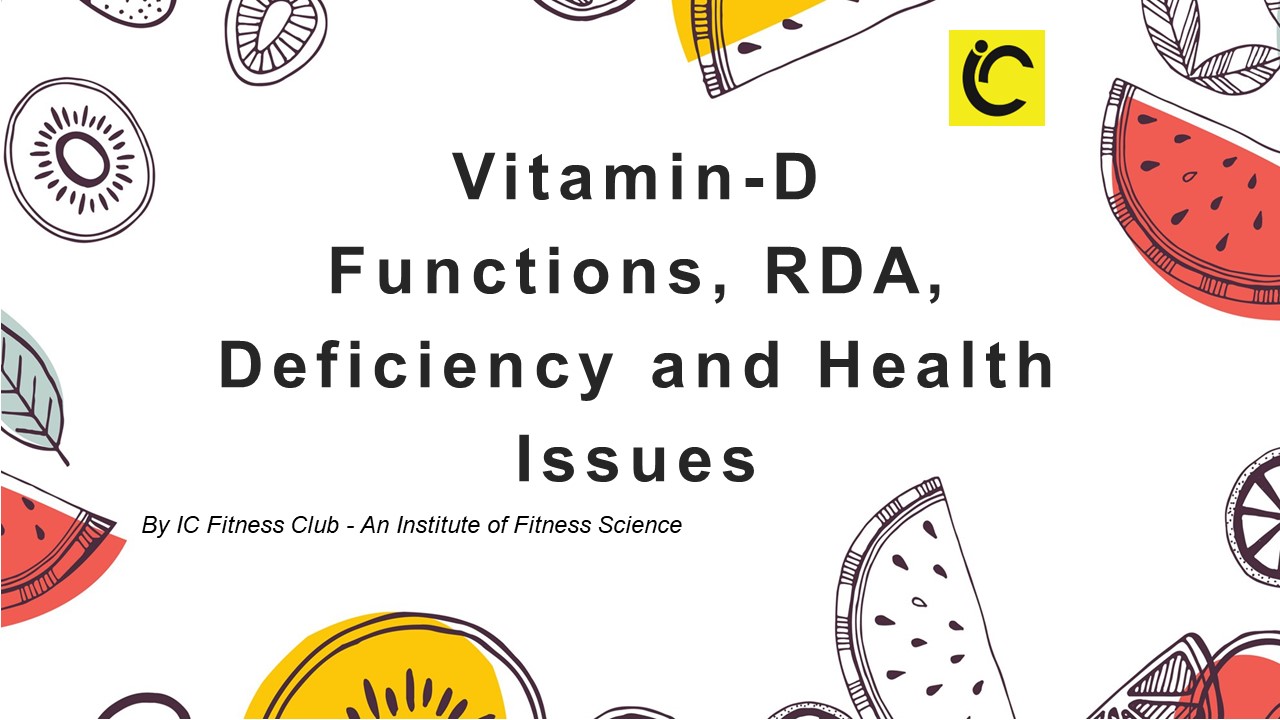Vitamin D (Functions, RDA, Deficiency and health issues. - PowerPoint PPT Presentation
Title:
Vitamin D (Functions, RDA, Deficiency and health issues.
Description:
Vitamin D is a fat-soluble vitamin known as the "sunshine vitamin" because the skin produces it when exposed to sunlight. It plays a crucial role in maintaining strong bones by aiding in the absorption of calcium and phosphorus. Vitamin D also supports the immune system, cell growth, and brain health. Dietary sources include fatty fish, egg yolks, and fortified foods, and supplements are available when sun exposure is limited. Both deficiency and excess can have health implications, so it's important to maintain an appropriate balance. – PowerPoint PPT presentation
Number of Views:12
Title: Vitamin D (Functions, RDA, Deficiency and health issues.
1
Vitamin-DFunctions, RDA, Deficiency and Health
Issues
By IC Fitness Club - An Institute of Fitness
Science
2
www.icfitnessclub.com
CONTENTS
1
2
Functions of Vitamin D
RDA of Vitamin D
3
Deficiency of Vitamin D Health Issues
3
Vitamin D (Introduction Function)
www.icfitnessclub.com
- Vitamin D is a fat-soluble vitamin that plays a
crucial role in several vital functions within
the human body. There are two primary forms of
vitamin D vitamin D2 (ergocalciferol) and
vitamin D3 (cholecalciferol). Vitamin D3 is
synthesized in the skin when exposed to
ultraviolet B (UVB) radiation from sunlight,
while vitamin D2 is obtained from certain
plant-based foods or supplements.
4
FUNCTIONS OF VITAMIN D
- Calcium and Phosphorus Absorption One of the
main functions of vitamin D is to enhance the
absorption of calcium and phosphorus from the
intestine. This process is essential for
maintaining proper bone health and
mineralization, preventing conditions like
rickets in children and osteomalacia in adults. - Bone Health Vitamin D helps regulate the levels
of calcium in the blood by promoting its
absorption from the gut and reabsorption from the
kidneys. It also facilitates the deposition of
calcium in bones, making them stronger and less
prone to fractures. - Cardiovascular Health Emerging research
indicates that vitamin D may have a positive
impact on cardiovascular health by helping to
regulate blood pressure, reduce inflammation, and
improve overall heart function.
5
- ....CONTINUED
- Immune System Support Vitamin D is involved in
the modulation of the immune system, helping it
to function efficiently and respond appropriately
to infections and diseases. It has been
associated with a reduced risk of autoimmune
diseases and may also play a role in reducing
inflammation. - Muscle Function Some research suggests that
vitamin D is important for maintaining muscle
strength and function, which can be particularly
significant in preventing falls and improving
physical performance, especially in older adults.
6
RDA(recommended Dietary Allowance) OF VITAMIN D
- The Recommended Dietary Allowance for adults 19
years and older is 600 IU (15 mcg) daily for men
and women, and for adults gt70 years it is 800 IU
(20 mcg) daily.
- Sources of Vitamin D
- Sunlight The most natural and significant source
of vitamin D is sunlight. When your skin is
exposed to UVB rays from the sun, it synthesizes
vitamin D3. The amount of vitamin D produced
depends on factors such as skin pigmentation,
geographic location, time of day, and season. - Foods Some foods contain vitamin D, but it is
not present in a wide variety of foods naturally.
Fatty fish (salmon, mackerel, tuna), fish liver
oils, beef liver, egg yolks, and fortified foods
like milk, orange juice, and cereals are some
dietary sources of vitamin D. - Supplements Vitamin D supplements are available
in various forms, including vitamin D2 and D3,
and are commonly used to ensure adequate intake,
especially in individuals who may have limited
sun exposure or dietary sources.
7
Deficiency of Vitamin-D Health Issues
- Osteoporosis and Osteomalacia Weak bones and
fractures. - Rickets Soft and weak bones in children.
- Muscle Weakness and Pain Weak muscles and
increased risk of falls. - Immune System Impairment Increased
susceptibility to infections. - Cardiovascular Problems Higher risk of heart
diseases. - Mood Disorders Increased risk of depression and
anxiety. - Autoimmune Diseases Linked to conditions like
multiple sclerosis and rheumatoid arthritis.
8
Thank you
- by
- IC Fitness Club - An Institute of Fitness Science
www.icfitnessclub.com































